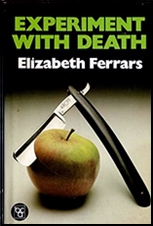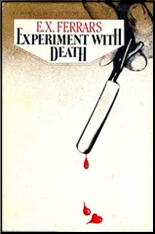Sat 1 Jan 2022

E. X. FERRARS – Experiment with Death. Collins, UK, hardcover, 1981, as by Elizabeth Ferrars. Doubleday, US, hardcover, 1981. Bantam, US, paperback, 1982.
A rough count I just made of the detective novels written by E. X. Ferrars came to over 70 of them, written between 1940 and 1995. I’ve sampled only a few of them, so it’s not possible for me even start to generalize, but off the top of my head, I’d say that of all of the authors over the years who’ve been compared to Agatha Christie in terms of cluing and twisty fair-play endings, Ferrars comes the closest.
A number of her book have series characters; unfortunately none of them are very memorable and that doesn’t help in keeping her name alive among mystery fans, even those who are well read. If you were to ask me about mystery writers whose work ought to be reprinted in a uniform series of books, I’d say she should be at the top of list, rather than obscure writers whose books have been so done, but whose books aren’t nearly as satisfying.

Experiment in Death is a standalone, and it’s a good one. It takes place in a pseudo-academic setting, which is to say a research institute whose specialty is the study of apples. There are no students involved, that is to say, but the usual petty grievances and jealousies that always seem to exist in academic-oriented mysteries are very much in play.
Dead is the director of the facility. He wasn’t unliked, but he seemed always to find pleasure in pitting faculty members against each other. Doing most of the detective work is the middle-aged Dr. Emma Ritchie, and even though she never seems to have ever run across a case of murder again, she does good work here, in a situation where alibis are crucial, as well a timetable consisting of statements of who was where when.
Complimenting matters is the fact that the time had been changed on many of the clocks found in rooms along the hallway where the dead man had his office. I love mysteries involving complications such as this. It doesn’t hurt that all of the characters with motives are real people with real fears and real concerns. I consider that as the bonus it so very much is, and you should too.
January 1st, 2022 at 11:10 pm
I have read a couple of hers and found them just about okay. This seems like an interesting one, esp the fact about the clocks. Will search for it.
January 1st, 2022 at 11:39 pm
I confess to having read only a few, and while the others were quite good, this one was the most enjoyable, by far.
January 1st, 2022 at 11:14 pm
I work in such a highly-technical environment we can’t even figure out who is actually in the building on any single day. If we ever had a murder investigation, no one would be certain of any such facts at all, under questioning.
Wouldn’t lobby security know who is on-site? Nope. We have two sets of swipe cards; only one of which only needs to be ‘waved’ at a guard to gain entry. People slip in all the time without swiping or scanning.
There’s a hodgepodge of building entryways which all obey different rules because of different tenants leasing in the same structure. Security itself is a third-party contractor. Construction workmen constantly go in and out unchecked. They can’t swipe through a turnstile barrier or a metal detector, and carry heavy equipment at the same time.
All the clocks on our computers are governed by a central ‘system clock’ somewhere –and they’re seven minutes fast –we simply live with this fact, knowing that it can’t be fixed.
Something like the twice-yearly daylight-savings-time adjustment throws everyone into chaos for at least a week.
We’re constantly having to double-check what we do against some imaginary real-world standard; standards which turn out to be very hard to even lay our hands on. Like, an analog watch with hands. Such gimgaw, often turns out to be the most trustworthy.
All I’m saying is that at least in my field people are less secure and sure of reality than ever before. My worksite is ringed with hi-security, yet it’s easier than ever to sneak in.
January 1st, 2022 at 11:42 pm
Things are different now, and yet some things don’t seem to change. There was only one person watching the front door in this book, and he was little more than a doorman. It led to a lot of leeway as to who the killer was. It could have easily have been a passing tramp. (Not that it was.)
January 1st, 2022 at 11:47 pm
Yep. Like in, ‘Three Days of the Condor’. The assassins show up in a mailman’s uniform and the guards buzz them right in. Front desk staff has a .45 in their desk drawer but they don’t get a chance to draw it. American security is a joke!
January 2nd, 2022 at 12:01 am
It’s not just American security that is lax. In WW II Jacques Cousteau working for FFI walked into Gestapo HQ in Nice at lunch in a stolen Italian uniform and photographed everything on the commandants desk and in his safe, then stormed out complaining no one was in the office to greet him.
Working for Pinkertons I busted an industrial espionage ring who were getting information by having the company presidents druggie son secretly photograph material in Dad’s office when he picked Dad up at work a couple of times a month.
Ferrars is one of those writers I always tell myself I need to read more of. She is fine, but I confess I find her detectives a bit dull.
I like that most of her books are slender lean reads with no more detail or involvement than she needs to get and keep you involved.
January 2nd, 2022 at 7:43 am
“… in ‘Three Days of the Condor’. The assassins show up in a mailman’s uniform and the guards buzz them right in.”
All the assassins in one uniform?
G.K. Chesterton had a Father Brown story called The Invisible Man, who was, of course…
January 2nd, 2022 at 9:22 am
Ferrars is one of my favorites—I found a bunch of her books at the library when I was in high school and got hooked and read basically all of them over the course of one summer. I think her best period is roughly 1950-1975, but Experiment with Death is one of her best novels. That said, she never really went off the rails like so many mystery authors do towards the end of a long career—her final novels are a bit workmanlike but still entirely readable.
August 1st, 2022 at 9:08 am
Hey, Steve. Thanks for stopping by my review of this one. My biggest exposure to Ferrars has been through her series starring Andrew Basnett (retired professor). I read all of those in the 90s and enjoyed them very much. Her stand-alones are less effective for me.